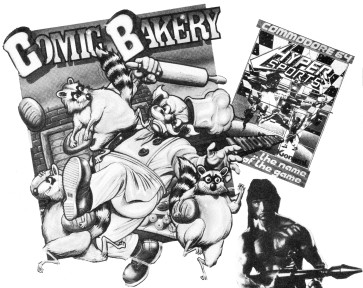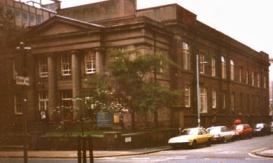- Home
- Musicians
- Martin Galway
- Night Tripping On The Late Fantastic
Night Tripping On The Late Fantastic
- By Sean Masterson
- Published 11/15/2006
- Martin Galway
- Unrated
 Music has become such an important and interesting aspect of Commodore 64 games that the people who write it are worth catching hold of for a chat. SEAN MASTERSON was sent 'home' to Manchester to talk to the man behind so much of Ocean's great compositions: MARTIN GALWAY. But he found the maestro had flown. It's not every week that I get a good excuse for a long weekend (just most weeks). Last week I was asked to take on British Rail once more in an attempt to get back to my home city of Manchester and interview the man responsible for some of the most remarkable music in arcade games at the moment, Martin Galway. No problem with that, I thought in my usual innocent manner. What could be easier than getting a train straight from Ludlow, interview the man himself and relax for the rest of the weekend? Oh, but there was plenty that could go wrong, if only I knew... The trip was simple enough and yes the train was on time (so much so that I almost missed it - I was beginning to wonder why BR didn't simply reschedule their trains to arrive twenty five minutes late). I wandered through the packed city centre, past the monumental Central Library and before you could say Taumatawhackatangihangikua - uotamateaturipukakapickimau - nghahoronuka - pukawhena - whackatanatahumatakuaitanat - urikapamikitura, I was being confronted by Ocean's legendary Tropical Fish Tank. Now this is where things began to go sadly wrong. Martin wasn't there. He had been rushed off to London at short notice and would not be back until the evening. Hmmm, tricky. But thanks to a miraculous piece of technology (courtesy of British Telecom) and a timely piece of Newsfield-Ocean co-operation, I managed to interview Mr Galway while he was cruising up the M1 via the car phone (who says programmers aren't jet-setters?) and so what follows must be one of the fastest long distance interviews ever carried out for a computer publication (Mad Masterson sets a new record). |
|
|
First I was sent deep within the bowels of the Ocean Empire and cast into the programmers' pit. Actually, they're a marvellously friendly bunch who set me up with the first decent cup of coffee I'd had that day before unveiling their masterplan. They seemed pleased too, that sub-titles would not be needed to speak to a fellow Northerner (we at Newsfield try to please, you see). Soon after being treated to a glimpse of how the Oceaners develop games in-between get-ting different computers to talk to each other, the phone buzzed and I was talking to the nephew of the famous flautist James Galway about how he created his kind of music. |
 Ocean Software Ltd |
|
But before I go on any further, I had better explain some of the complications of interviewing somebody who's doing the better part of a - er, seventy miles an hour. Throughout this country of ours, there are a number of different Cellnet receivers to cope with signal reception of radio phones in different areas. These work in a relay to get the call back to you. If you exit one area during a call, the system disconnects you while it finds a better route for the call. Is no-thing simple? The result in this case was, of course, that I was never on the phone for more than a few minutes at a time so our conversation was crackly and disjointed-but interesting nonetheless. The first thing to sort out was exactly how many games Martin had been involved in. The list is quite impressive, The Never Ending Story, Hypersports, Roland Rat, DT's Decathlon and more recently Streethawk, Transformers, Comic Bakery but perhaps most outstanding is his work on Rambo which employs a variety of themes - not always complex or indeed remarkable in terms of stretching the SID chip to its limits' but certainly brilliantly designed musically with atmosphere and character that often makes the work of his competitors' seem barren by comparison. |
|
Spread The Word
Article Series
This article is part 2 of a 3 part series. Other articles in this series are shown below:
-
Night Tripping On The Late Fantastic



